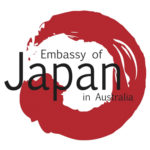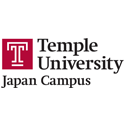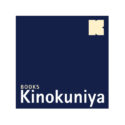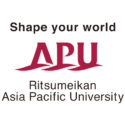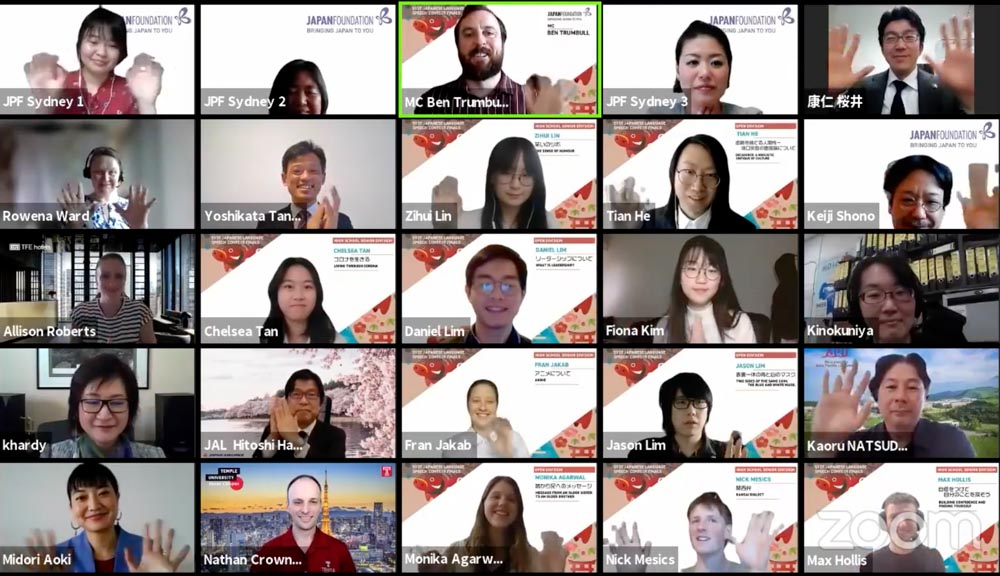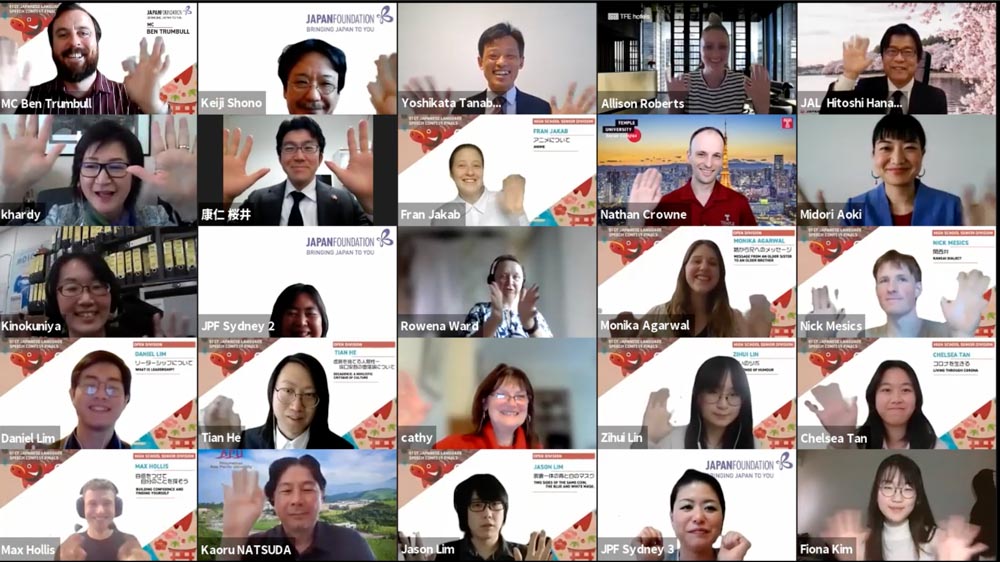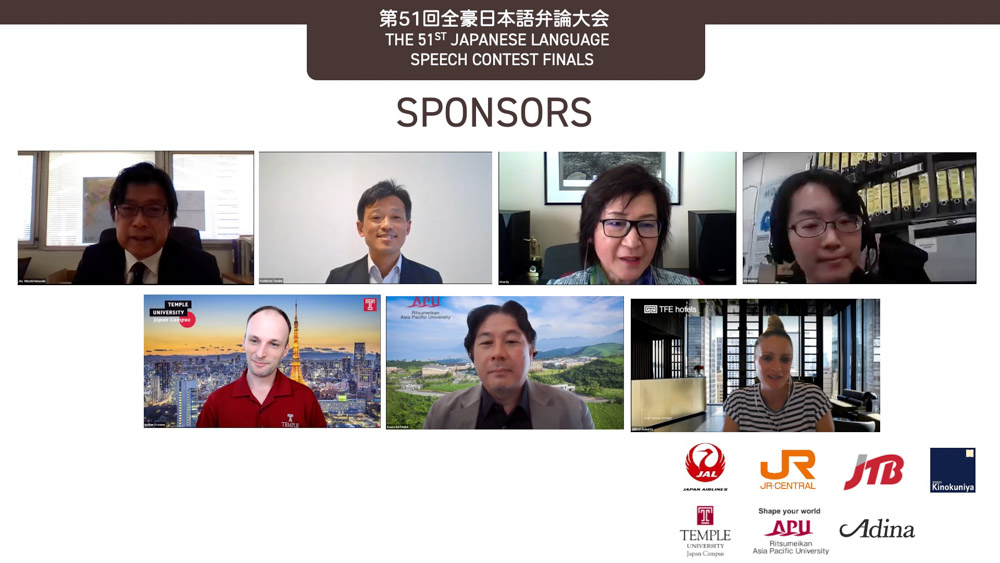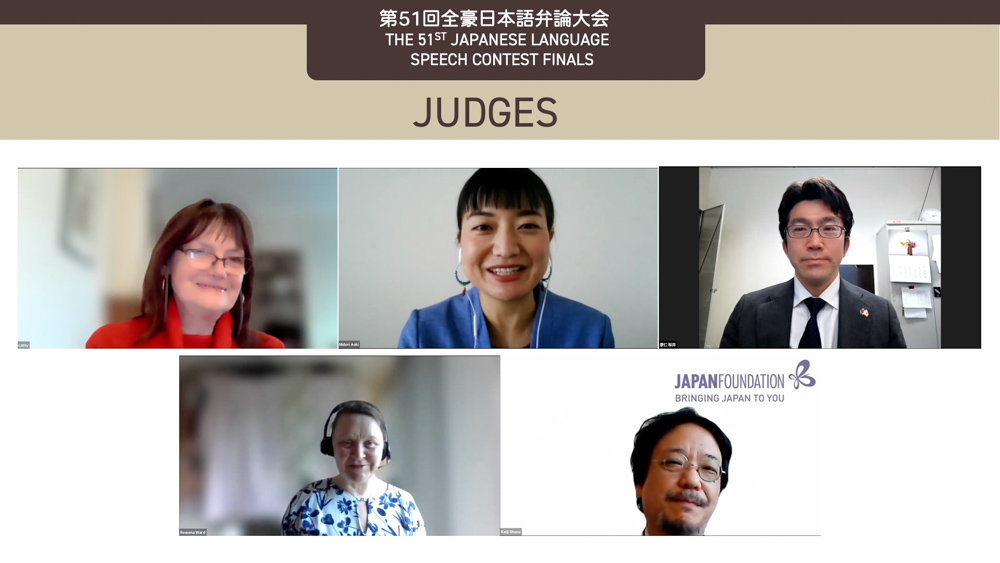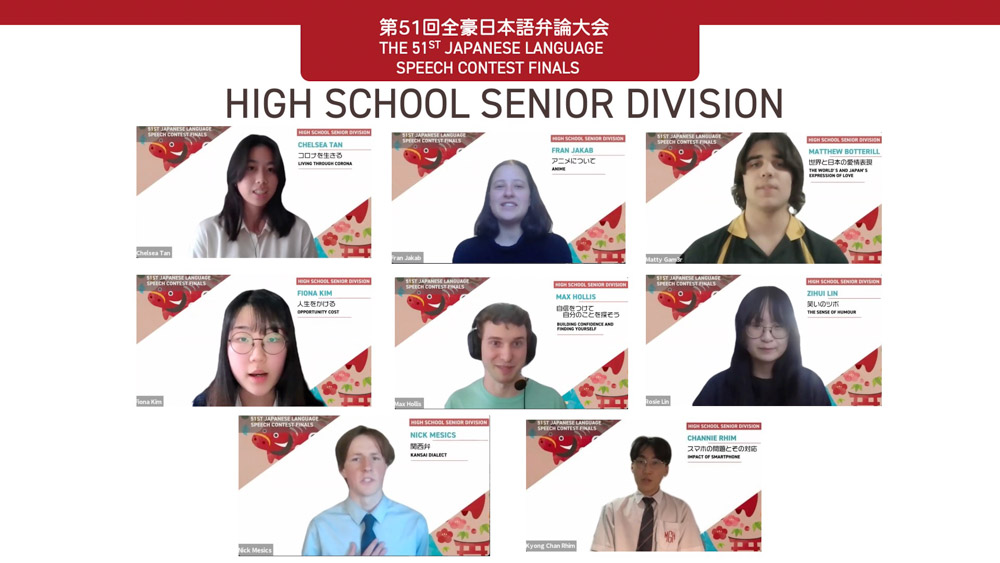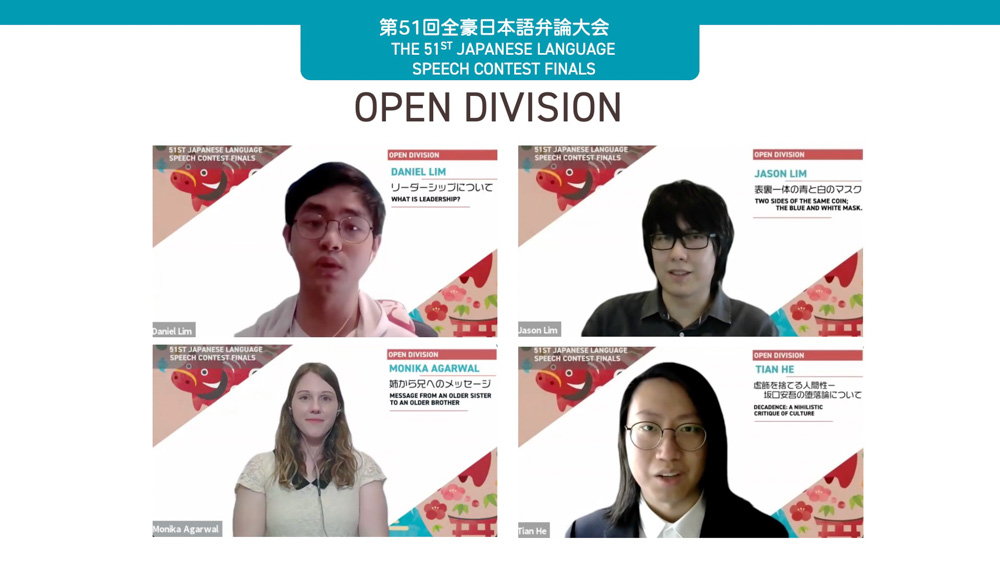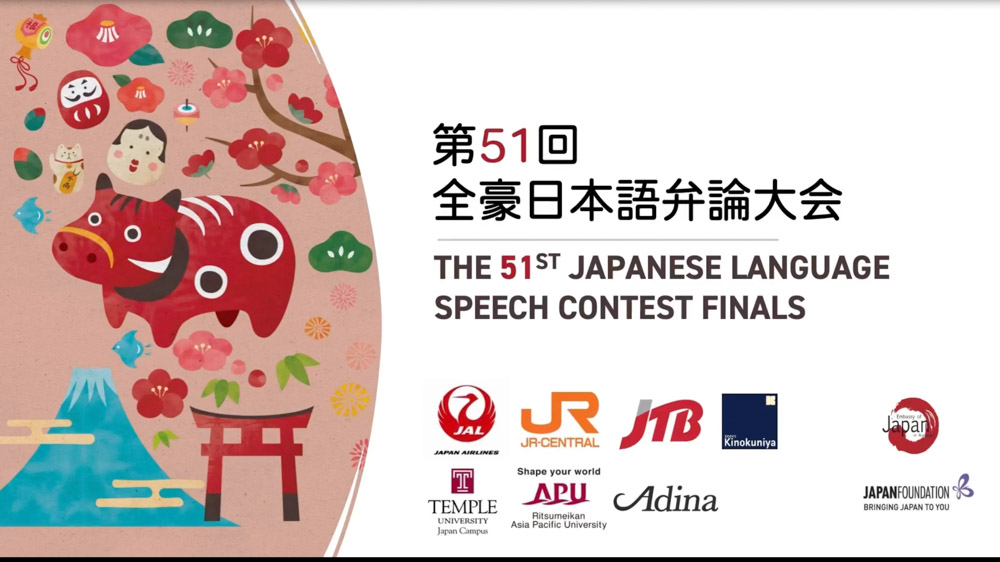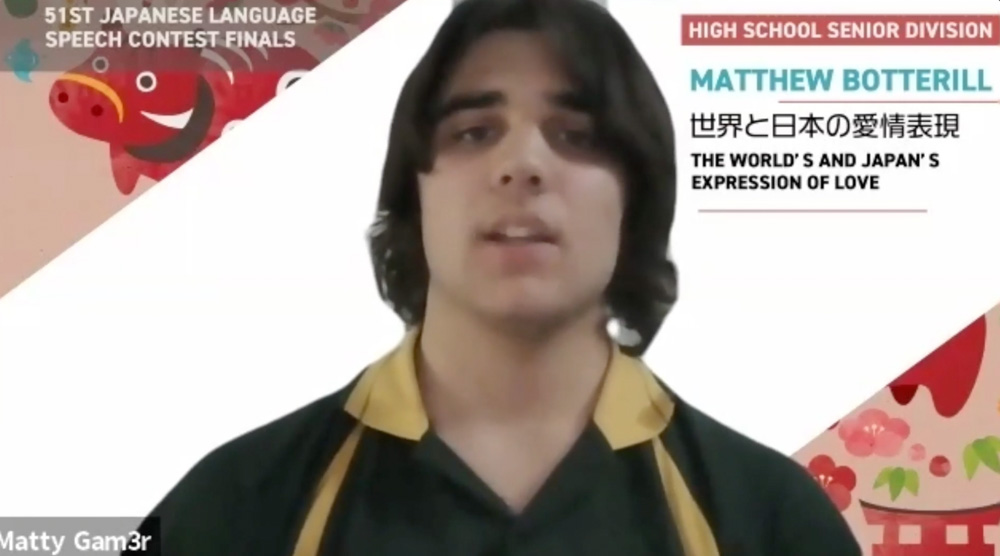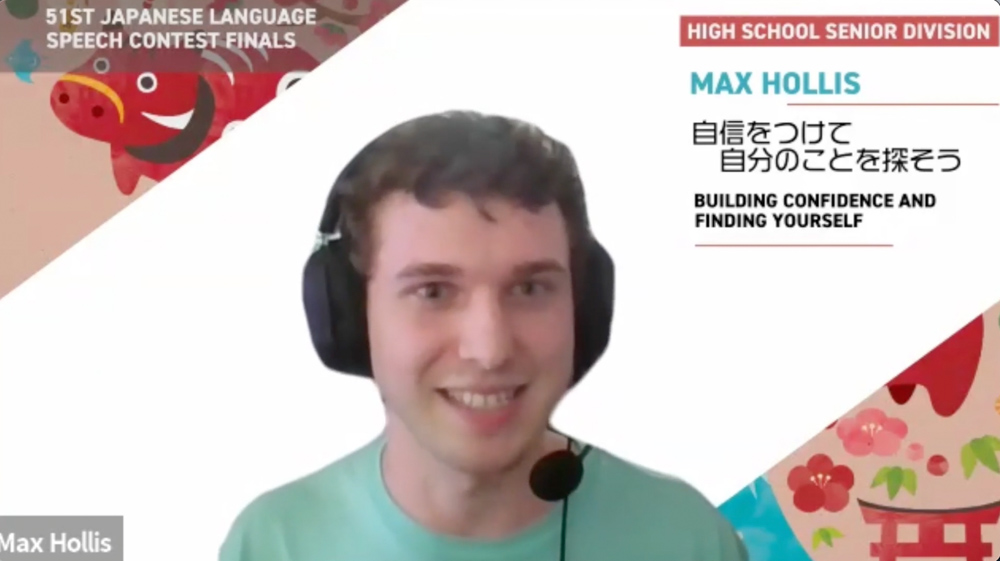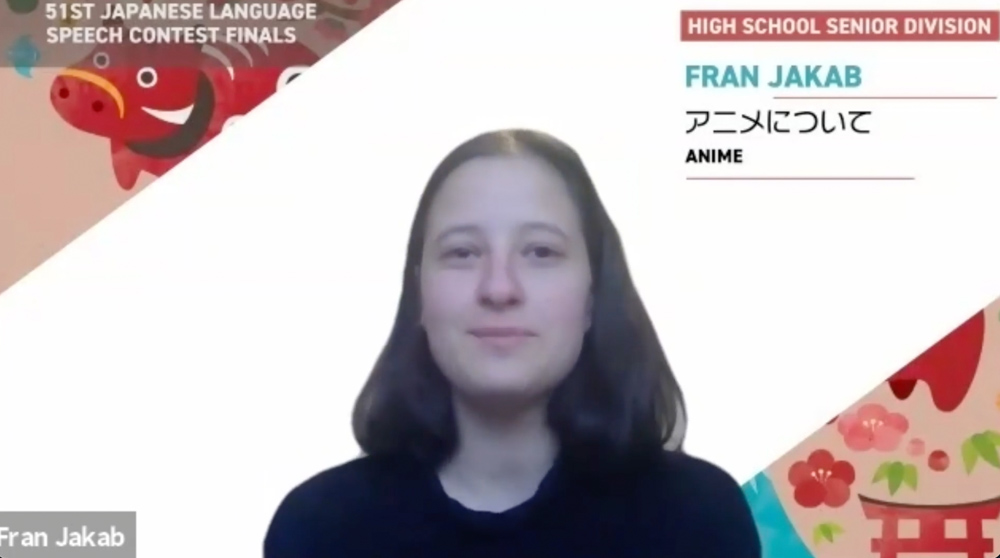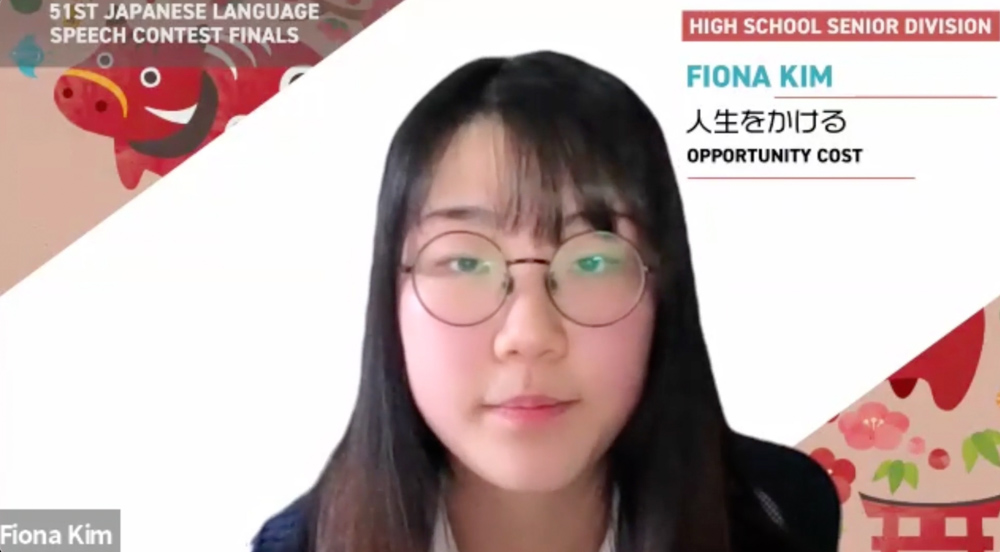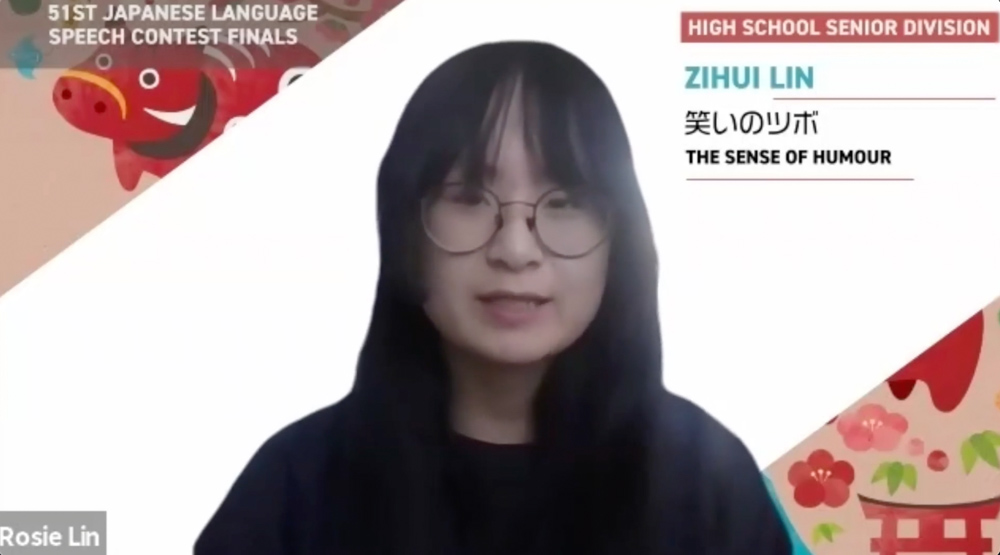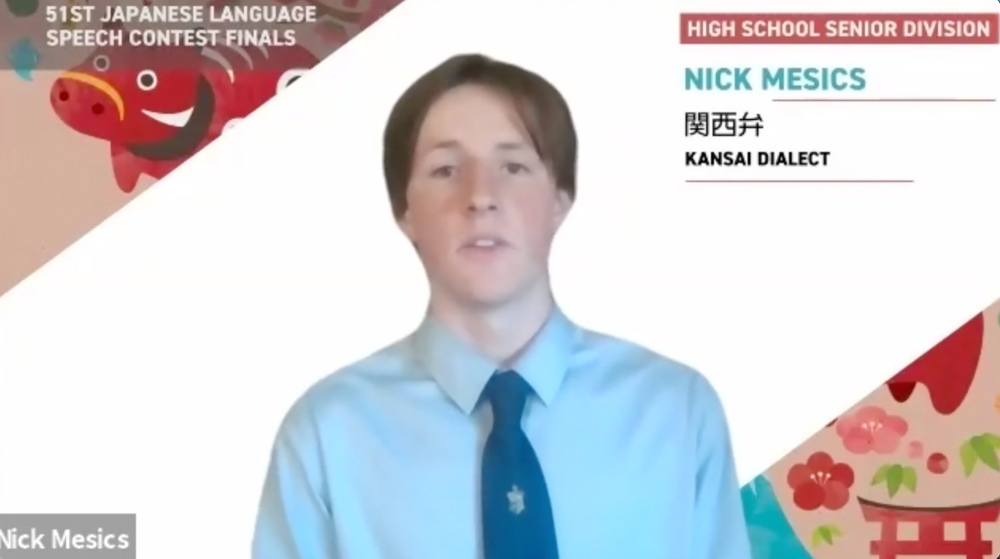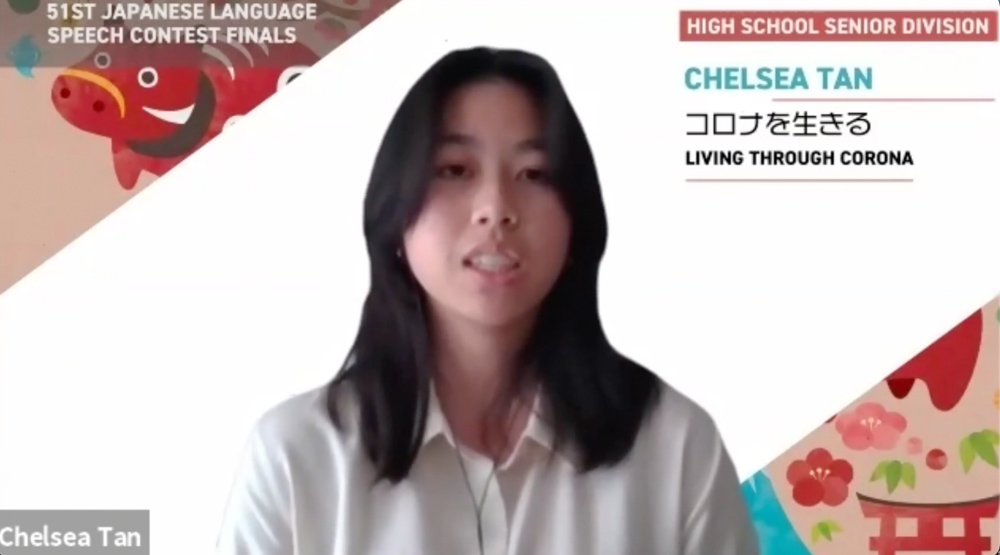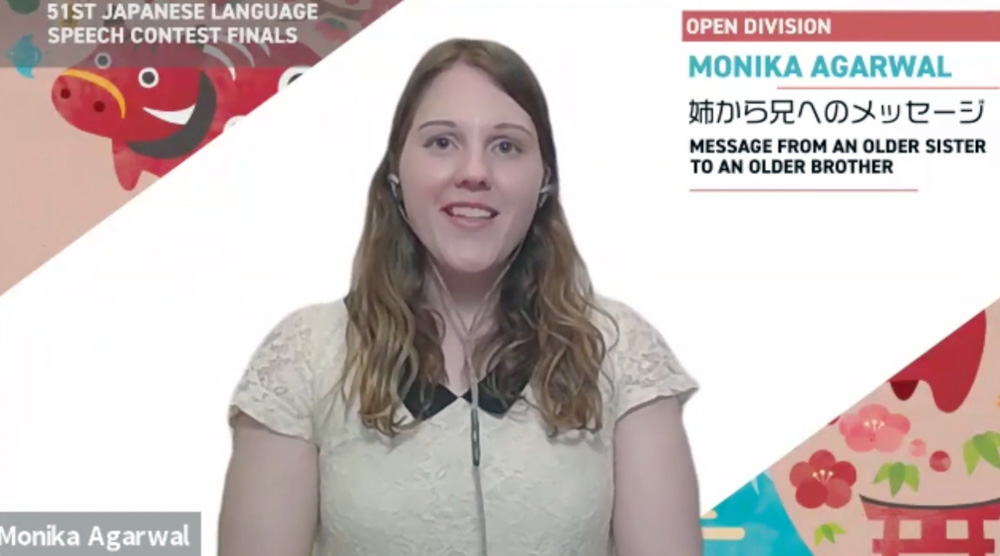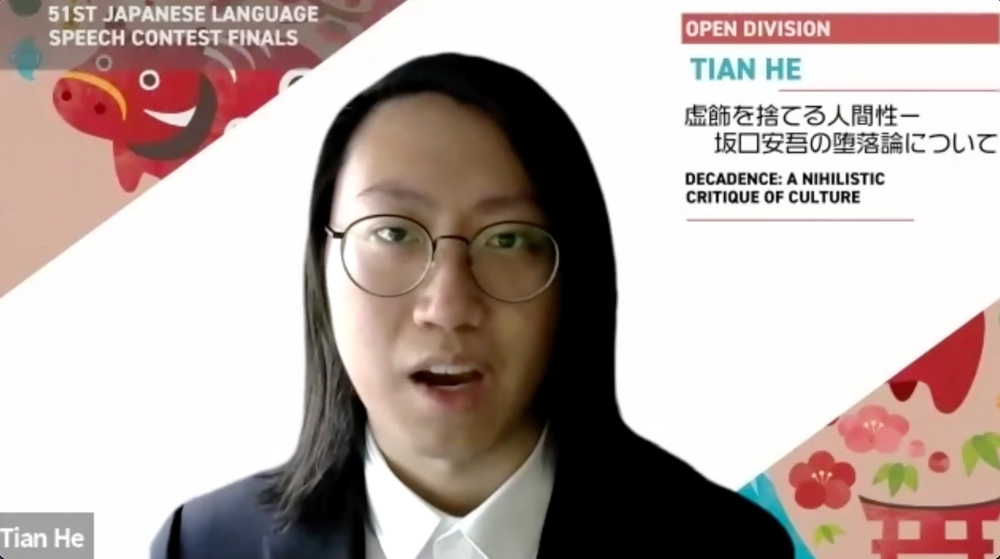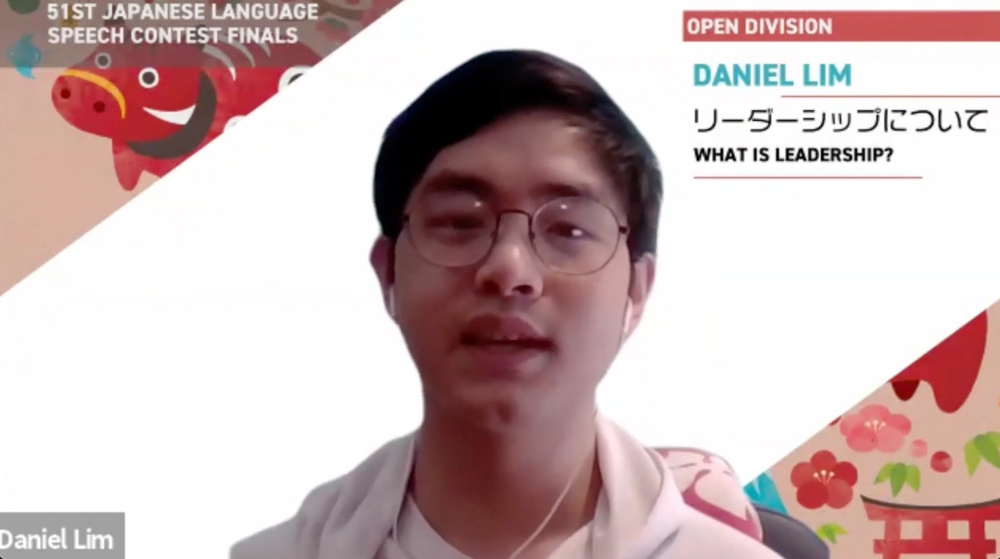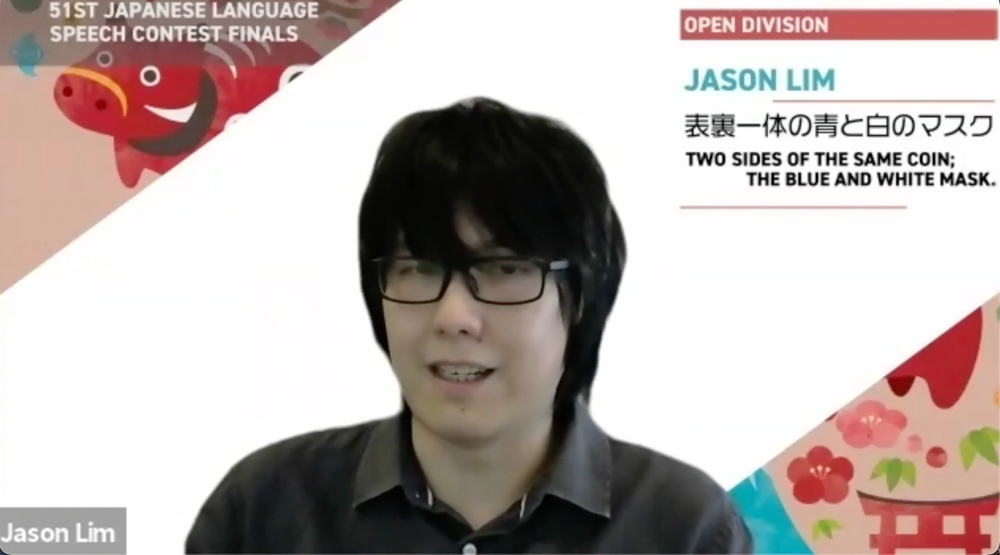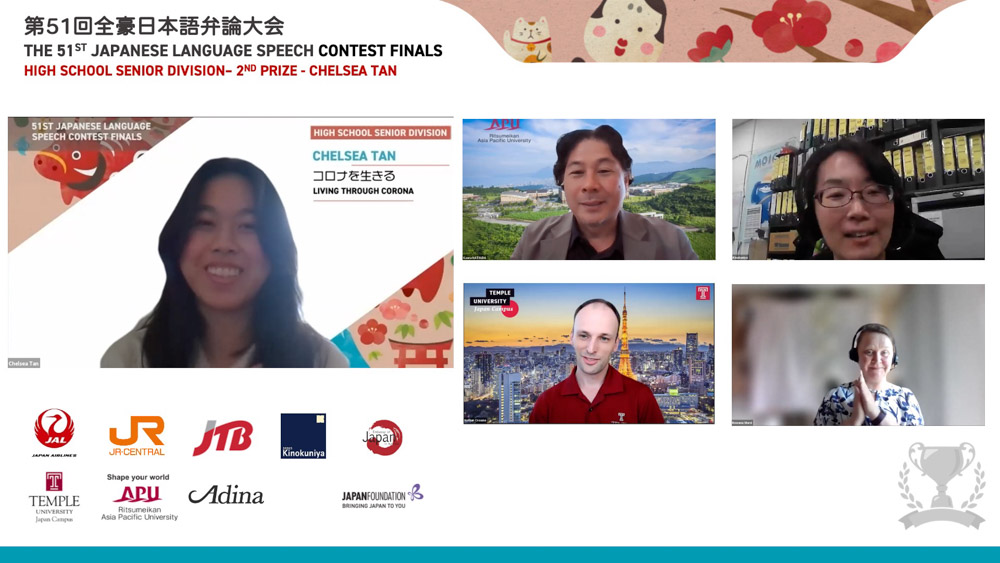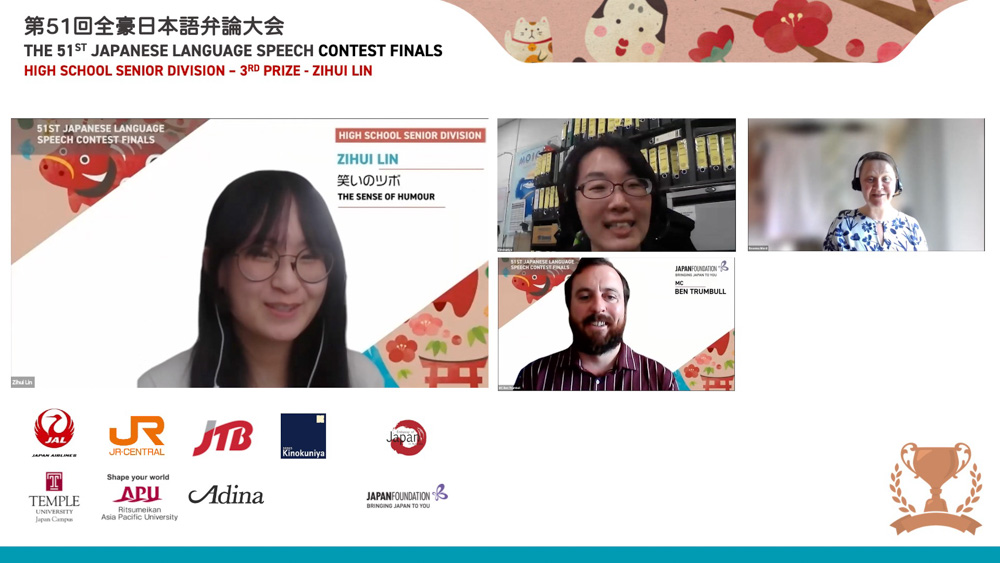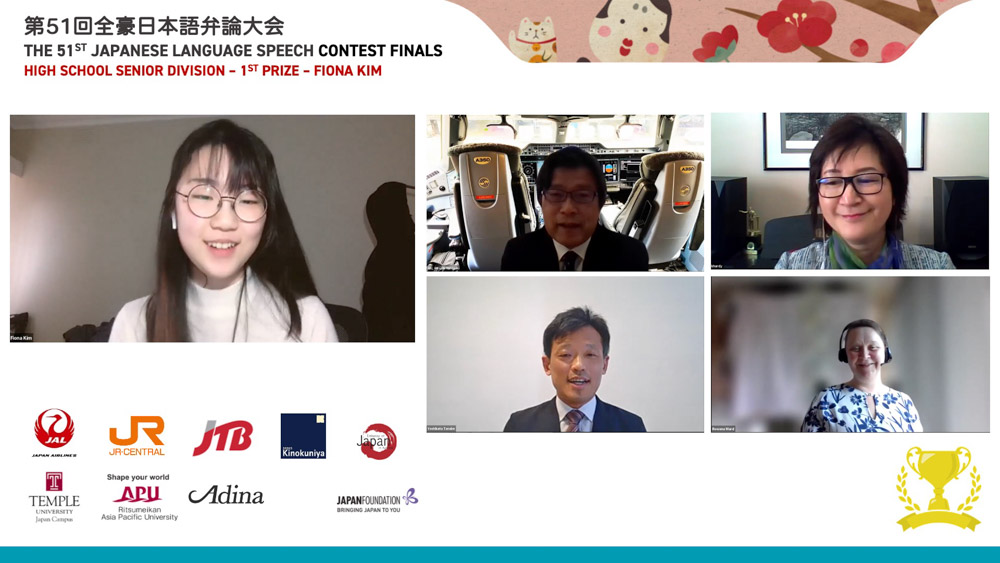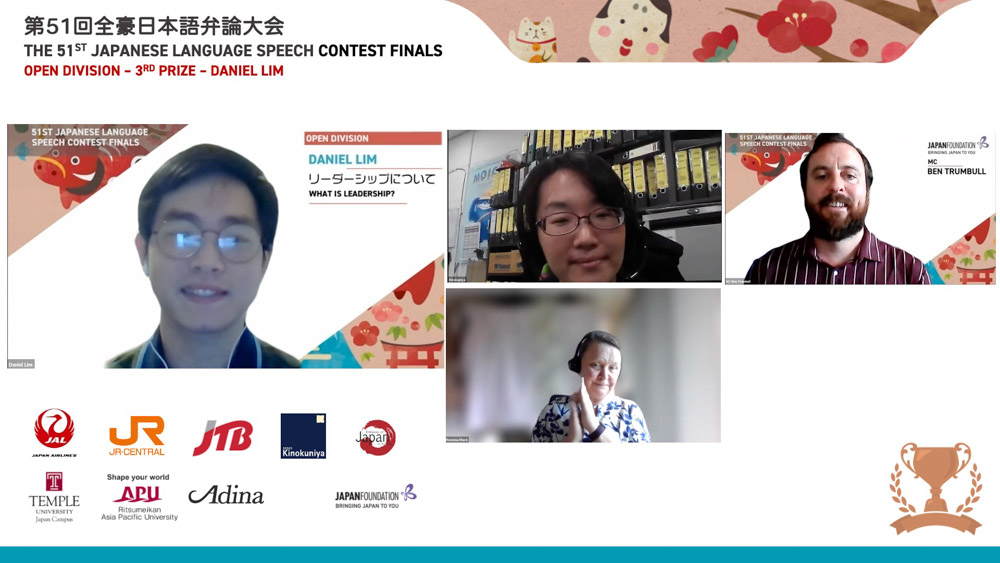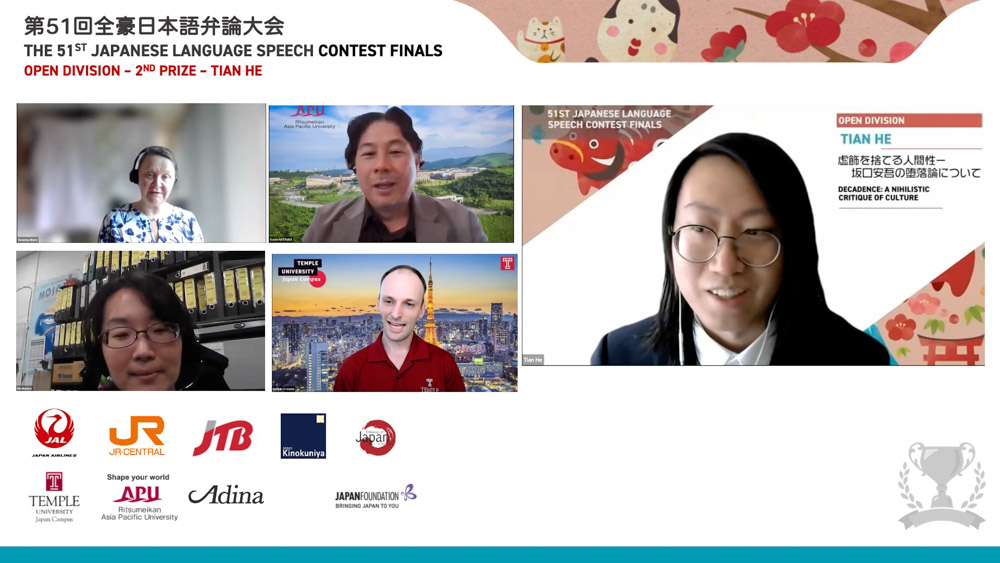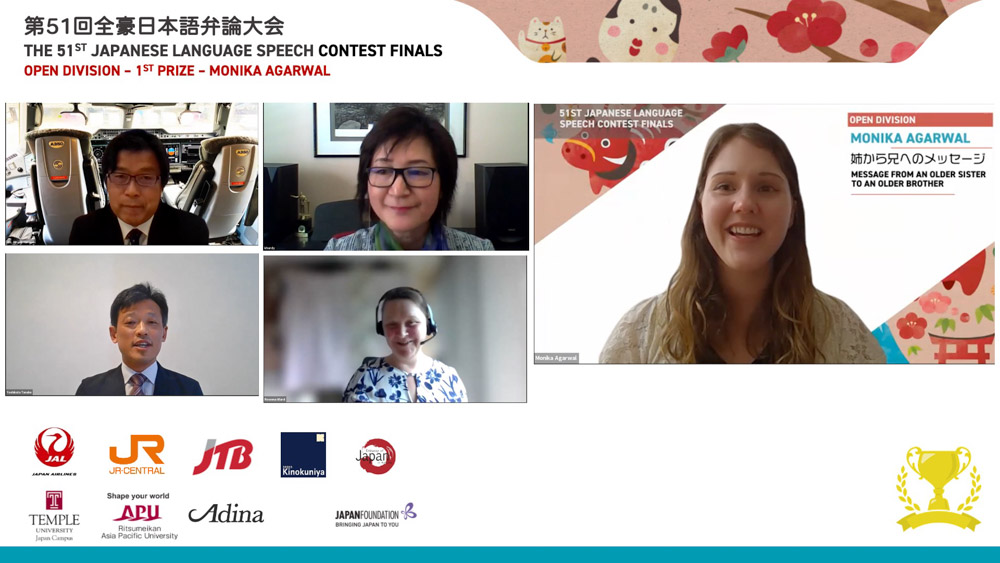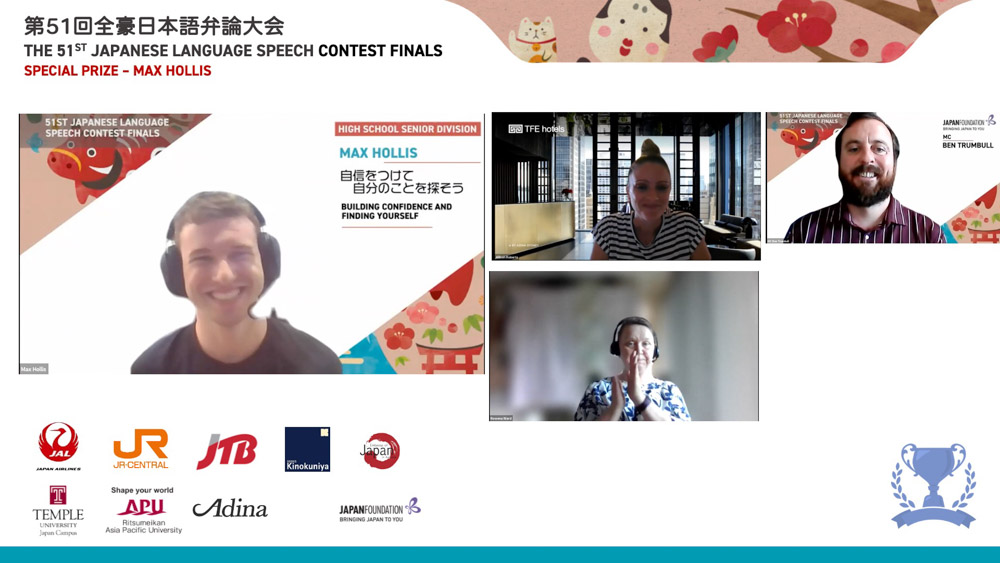
52nd Japanese Language Speech Contest Finals
The 52nd Australian Japanese Language Speech Contest Finals were held by video entries from the state/territory level contest winners in the following two divisions.
- High School Senior Division
- Open Division
Congratulations to everyone who participated in the contest!!
Ambassador YAMAGAMI’s Message
 I am delighted to have the opportunity to share a message for the 52nd Japanese Language Speech Contest Finals.
I am delighted to have the opportunity to share a message for the 52nd Japanese Language Speech Contest Finals.
Firstly, I would like to congratulate all the finalists on becoming representatives of their state or territory, and progressing to the national finals. I would also like to express my gratitude to all the candidates who participated in the state and territory competitions, as well as the organiser and supporting organisations of this wonderful event.
I am always proud to note that Australia has the largest number of Japanese learners per capita in the world. A strong interest in one another’s languages and cultures has been foundational for the Japan-Australia relationship, and will strengthen it in the years ahead, helping to underpin people-to-people ties.
I wish the finalists all the best for this year’s competition, and I hope they enjoy the opportunity to use Japanese to tell their stories and express their opinions. I am sure that this year’s contest will be another successful event, inspiring all Japanese learners to continue their studies and to pursue their interests in Japan.
YAMAGAMI Shingo, Embassy of Japan in Australia
Judges
| Jeremy Breaden | Monash University |
| Melissa Luyke | Hyogo Prefectural Government Cultural Centre |
| Yoko Tanaka | Japan National Tourism Organization |
| Yasuhito Sakurai | Embassy of Japan in Australia |
| Keiji Shono | The Japan Foundation, Sydney |
2022 Prizes
| 1st Prize | 
Middle and right images: © Kyoto Tourism Council
Return air ticket to Japan courtesy of Japan Airlines 7-day Japan Rail Pass* courtesy of Central Japan Railway Company *This product may change. One of JTB selected Half Day Tours in Japan courtesy of JTB Australia |
| 2nd Prize | $200 prepaid Gift Card courtesy of Temple University Japan Campus
$200 prepaid Gift Card courtesy of Ritsumeikan Asia Pacific University |
| 3rd Prize | $200 voucher courtesy of Kinokuniya Bookstore of Australia |
| Special Prize | Overnight accommodation for two in Australia courtesy of TFE Hotels, valued at $500 |
Japan Airlines (JAL)
JR-Central
List of Contestants
The state/territory level contests were held between August 7 and September 3. Below is the list of the contestants in High School Senior Division and Open Division who are representing their state/territory at the Australian Japanese Language Speech Contest this year. (Alphabetical order)
High School Senior Division
| Hussain Al-Ibrahim | Darwin High School, NT |
| Yiming Bu | Norwood International High School, SA |
| Dipika Choudhury | Perth Modern School, WA |
| Sophia Chu | Mount Waverley Secondary College, VIC |
| Nivritti Kumar | Macquarie Fields High School, NSW |
| Jazmine Lee | Narrabundah College, ACT |
| Joshua Luk | The Friends’ School, TAS |
| Eliza Thorpe | St Andrews Lutheran College, QLD |
Open Division
| Yingxi Dai | Monash University, VIC |
| Erin Garrard | ACT |
| Anthony Russo | SA |
| Zhipei Zheng | WA |
Announcement of the 2022 National Winners!
2022 High School Senior Division
The 1st Prize Winner’s Speech
The 2nd Prize Winner’s Speech
| Prize | Name | Speech Title |
| 1st | Dipika Choudhury (Perth Modern School, WA) |
STEMと女子の将来 STEM and Girls’ Future |
| 2nd | Jazmine Lee (Narrabundah College, ACT) |
ピーナッツアレルギーと共に生きる Living with a Peanut Allergy |
| 3rd | Sophia Chu (Mount Waverley Secondary College, VIC) |
入れ墨の偏見 Tattoo Prejudice |
Speech Summaries
STEMと女子の将来/STEM and Girls’ Future
In our world today, many say that technology is the future- but whether it be Australia or Japan, women are barely present in STEM fields. Particularly in Japan, even favourable discrimination such as the term “Rikejo” perpetuates the gender divide in STEM subjects during high school. At first. I myself was apprehensive to studying computer science at school. My mum persuaded me to study the subject, but concerns about not having any friends in my class and being worse than all the boys made me dread going to my first class. However, eventually I realised I did enjoy the subject and became better at it, so I’m grateful someone pushed me to take the opportunity. I hope other girls like me can also have someone in their lives push them to give STEM a chance, so that terms like Rikejo no longer exist.
ピーナッツアレルギーと共に生きる/Living with a Peanut Allergy
I have lived with a severe peanut allergy for as long as I can remember, and it will likely stay with me for the rest of my life. Through my speech, I wanted to share what it is like living with a life-threatening allergy and how it affects day-to-day life. I also wanted to raise awareness of the potentially deadly impacts of allergies. Whilst many people are aware of what an allergy is, through my experiences, I have found that there is often a misunderstanding of how severe they can be. Several times, people have told me that “it should be fine” when they are unsure whether food has peanuts. However, they do not realise I can die if I eat even the smallest amount or if the food is contaminated.
入れ墨の偏見/Tattoo Prejudice
These discriminatory comments are circulating in both Japanese and Australian society. The negative perceptions, such as the association with yakuza and criminals, are still attached to tattoos. Resulting in people with tattoos being viewed as rebellious and socially undesirable. Despite the high frequency of tattoos in the Australian population and the open mindedness that most of us think Australian society has, the attitudes towards tattoos in the workplace still remain mixed. By comparing the social acceptance of tattoos in Japan and Australia, the history and culture of tattoos between the two societies could be greatly reflected. I think it is pivotal to spread the message that tattoos are simply a form of art and a form of self expression. In this 21st century, it shouldn’t really be frowned upon.
Comment from the Judges
On behalf of the judging panel, I’d like to thank all finalists, and indeed all entrants, for participating! We know it takes a lot of time, effort and courage to prepare for a speech contest, and really appreciate your contribution. It was a genuine pleasure to listen to all the finalists’ speeches. The content was very varied, but one thing that all speeches had in common was that they had an individual touch, give us insights into the finalists’ opinions, interests and passions. I have never met any of the finalists, but I genuinely feel I know a little bit about each of them now. The most successful speeches were those which connected their individual insights with a clear and persuasive message, delivered confidently and in clear, approachable Japanese. I congratulate all finalists and encourage you to continue your journey into the wonderful world of Japanese language and culture. (Jeremy Breaden)
2022 Open Divison
The 1st Prize Winner’s Speech
The 2nd Prize Winner’s Speech
| Prize | Name | Speech Title |
| 1st | Yingxi Dai (Monash University, VIC) |
死から生へ:川端康成の死生観と美意識 From Death to Life: The Aesthetics of Kawabata Yasunari |
| 2nd | Erin Garrard (ACT) |
声優の力 The Power of a Seiyuu |
| 3rd | Zhipei Zheng (WA) |
日本の近代文学の魅力 The Beauty of Japanese Modern Literature |
Speech Summaries
死から生へ:川端康成の死生観と美意識/From Death to Life: The Aesthetics of Kawabata Yasunari
Yasunari Kawabata is an insurmountable monument in the history of Japanese literature, and his literary works show the traditional culture of Japan and the social environment of the time. The idea of mono-no-aware, as an indispensable part of the construction of traditional Japanese culture, became a common medium for Japanese writers to express their feelings in the scenery and to express their sorrow. This pessimistic philosophy can also be felt everywhere in the literary works of Yasunari Kawabata. I will start from the traditional Japanese idea of mono-no-aware, explore the emotions of mono-no-aware that is expressed in Kawabata’s works. Then analyse and present Kawabata’s unique idea of mono-no-aware, in which tradition and self, reality and confusion are intertwined.
声優の力/The Power of a Seiyuu
In my speech, I wanted to take the opportunity to have fun and play around a little with my voice, while also speaking about something I’m passionate about. Therefore, I decided to talk about the power of a seiyuu (voice actor) and about how their abilities can affect what sort of emotions we feel when listening to a character’s voice. Some people may think that being a seiyuu is an easy job, where all they have to do is speak from the script that’s in front of them. However, in my speech, I wish to show you all that it’s actually much more than that, and that there’s actually a lot of hard work and thought that goes into being a seiyuu. I hope you enjoy!
日本の近代文学の魅力/The Beauty of Japanese Modern Literature
A great motivator in my Japanese study journey has been the desire to read Japanese novels in its purest and unfiltered form, without translations twisting and turning the meanings. The reason is because there’s an indescribable charm to Japanese literature in how it explores the deepest depths of human emotions. In this speech, I will talk about my favourite novel of all time, Natsume Souseki’s Kokoro, one of the great novels of Japan, and how it had prompted me to contemplate my own actions and think deeply about various facets of my own life. I will talk about the story of the book and hopefully by the end of the speech, convince you, the listener, to pick up a book and start reading.
Comment from the Judges
Japanese literature, voice acting, ageing … the lineup of speeches in the Open Division was highly diverse and brimming with originality. The judges were particularly impressed by each finalist’s ability to communicate their ideas in an approachable way despite the complexity of their subject matter. Sophistication of ideas plus simplicity of expression and clarity of delivery equals a great speech. I can assure you that the competition for the top placings in this division was very tight and finalists should be proud of their achievements regardless of where they placed in the end. Well done, everyone! (Jeremy Breaden)
2022 Special Prize
Sponsored by TFE Hotels
| Name | Speech Title |
| Hussain Al-Ibrahim (Darwin High school, NT) | 科学的じゃない妖怪 Non-scientific Youkai |
Speech Summary
科学的じゃない妖怪/Non-scientific Youkai
During my research into Japanese culture, I came across the concept of “Yōkai”, which is a term used by Japanese people to describe supernatural entities and spirits. Having a very scientifically oriented outlook on things, I was very skeptical and closed-minded about this idea when first stumbling upon it. However, after researching deeper into the true meaning behind Yōkai, I came to see its significance in Japanese people’s lives and culture. In “Non-scientific Yōkai”, I hope to share my research experience with everyone, and in doing so, preach the importance of being open to new and unfamiliar concepts. Typically, we are quick to judge cultures and ideas alien to us because they go against our own beliefs and perspectives on things. However, if we dive beneath the surface, we will find that these cultures and concepts play a major role in the lives of others.
Comment from the Judges
As usual it was very difficult to select a single stand-out speech for the Special Prize, but all judges agreed that this speech had a ‘special something’. From its intriguing title right through to the final message about opening your mind to new ways of looking at the world, this speech displayed a great combination of originality and careful planning. Moreover, it was delivered in a distinctively engaging style with clear enunciation and listener-friendly timing. Hussain-san, omedetoo gozaimasu! (Jeremy Breaden)


